IGCS Summer School 2024
19. February – 01. March, 2024
RWTH Aachen, Germany
Regenerative Urban Futures – Circular Economies and Societies
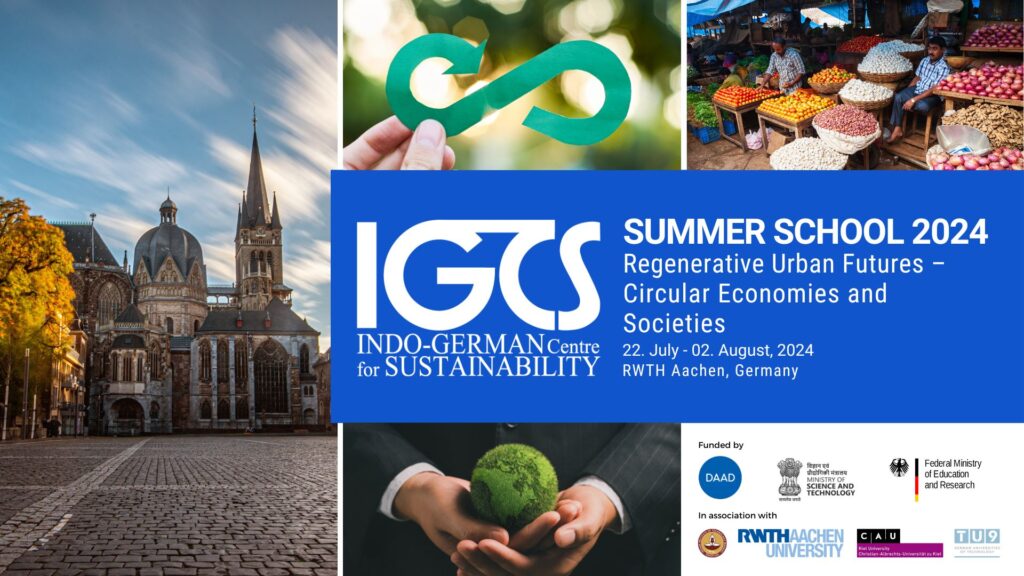
In current debates, regeneration is often viewed as going a step further than sustainability, for rather than sustaining particular conditions, regeneration stresses on the capacity and ability to recover and even evolve beyond the existing state of affairs. By urban we mean a wide array of situations and conditions that refer to a broad view on spatial configurations. These include not only clearly identifiable cities and towns but equally the phenomenon of planetary urbanization as part of the Anthropocene, i.e. rapidly urbanizing rural areas, large metropolitan agglomerations, urban fringes and periurban areas that lie far outside the urban hubs.
While the range of public policies and private initiatives that promote circular and resource saving practices is growing, requirements of regionally adapted approaches are often overlooked. Even ‘Circular City’ schemes, propagated by the European Union, have hardly managed to create perceptible outcomes so far. During the IGCS Summer School, university students from India and Germany will collectively explore place-specific socio-economic conditions and development interdependencies that matter for achieving more circularity especially in urban areas. Cities offer important assets and actors for circular approaches, yet also concentrate lots of resource consuming and waste producing activities. The Summer School lecture program and interactive workshops will provide ample opportunities for mutual learning on economic as well as societal facets of circularity.
The objectives of the IGCS Summer School are:
- To build collective awareness on the challenges we face as rising urban populations lead to increasing resource consumption in line with environmental depletion.
- To understand how broad the range of circularity options is that could be used to address sustainable development challenges, adapted to place-specific economic and social conditions.
- To develop strategies that combine circular economy and society solutions towards a more sustainable, regenerative future for urban areas.
This Summer School will cover topics such as:
- General sustainability risks caused by contemporary production and consumption practices
- Various objectives and options associated with the circular economy (‘R-strategies’, such as reduce, reuse, remanufacture, recycle etc.).
- Approaches towards more reflected, less resource intensive consumption and associated social innovations
- Planning tools, instruments, and processes that are required to foster circularity in the urban economy and society, including administration and governance approaches
- Options for technology transfer from academic R&D for more circularity
- The role of key personalities, entrepreneurs, and markets in solving these challenges
IGCS Winter School 2024
19. February – 01. March, 2024
IIT Madras, Chennai, India
Regenerative Urban Futures – Integrated Spatial Planning for Resilience
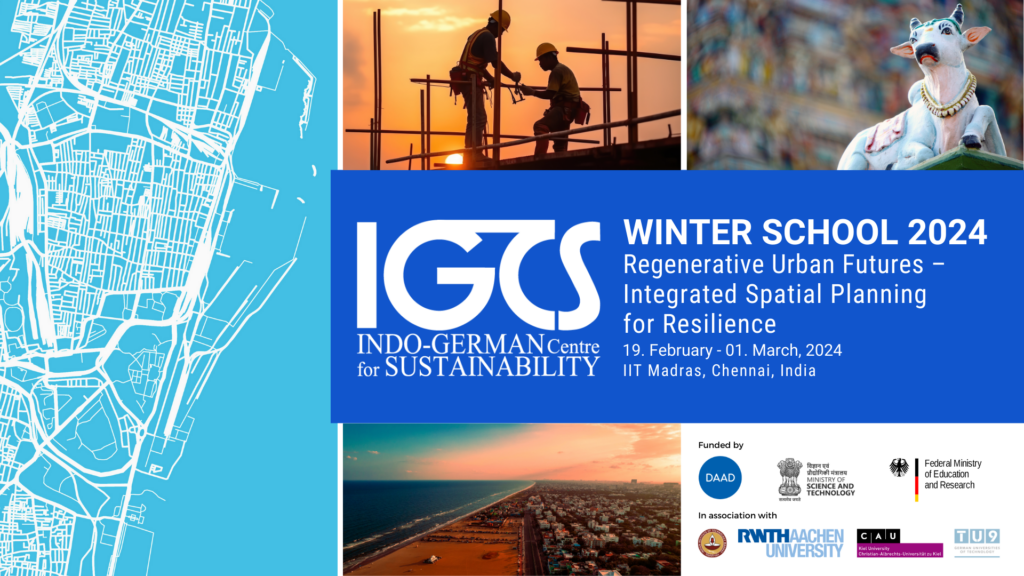
The IGCS schools in the year 2024 are taking place under the umbrella theme “Regenerative Urban Futures”.
In current debates, regeneration is often viewed as going a step further than sustainability, for rather than sustaining particular conditions, regeneration stresses the capacity and ability to recover and even evolve beyond the existing state of affairs. By urban, we mean a wide array of situations and conditions that refer to a broad view of spatial configurations. These include not only clearly identifiable cities and towns but equally the phenomenon of planetary urbanization as part of the Anthropocene, i.e. rapidly urbanizing rural areas, large metropolitan agglomerations, urban fringes, and periurban areas that lie far outside the urban hubs.
By virtue of this overall framing, the topic of the Winter School takes up a persistent and prominent challenge for decision-makers, namely the interface of adequate planning instruments with resilience as one pivotal goal of regenerative urban futures. Simply put, what are we doing today, and what can we do tomorrow to ensure sustainable, resilient, adaptive, and regenerative urban development? Integrated spatial planning is likely to be a key solution. Here, two aspects are important: first, how can we design the morphology (patterns, demographics) of human settlements to ensure spatial integration of land use functions, and secondly, how can we best administer and manage the planning and governance process? Both these dimensions are aimed at overcoming compartmentalisation, silos, fragmentation, and opaqueness – a quality that characterizes many urban settlements across the world. For that matter, integration has been for long a challenge and a contentious issue, and yet, as a goal, it has become even more relevant nowadays as we are faced with complex, wicked global problems with consequences and repercussions in specific local contexts such as climate change and disaster risks, environmental degradation, social inequalities and disparities, or the globalization of markets and trade. For these reasons, a systems perspective is essential, in particular, taking into consideration eco-social and socio-technical systems and their transformation.
The objectives of the Winter School are:
- To build collective awareness of the challenges we face as urban populations rise and face issues related to resource depletion, climate change, job security, and so on.
- To understand socio-technical solutions that are available today and are being used to address these challenges.
- To theorize on strategies that we can take to ensure a sustainable, regenerative future for urban areas.
This Winter School will cover topics such as
- Climate and disaster risk adaptation and management
- Interface of the built environment with ecosystems and ecosystem services and a systems perspective to analyze these linkages.
- Planning tools, instruments, and processes that are required to foster integrated spatial planning and enhance resilience.
- Administration and governance approaches
- Nature Based Solutions, Technological Solutions, and Social Solutions to Urban Challenges
- The role of entrepreneurs, markets, and policy in solving these challenges
IGCS Summer School 2023
24. July to 04. August, 2023
Technical University in Berlin, Germany
The Integration of Renewable Energies into a Power Grid – A Key Contribution towards a Carbon Neutral Society
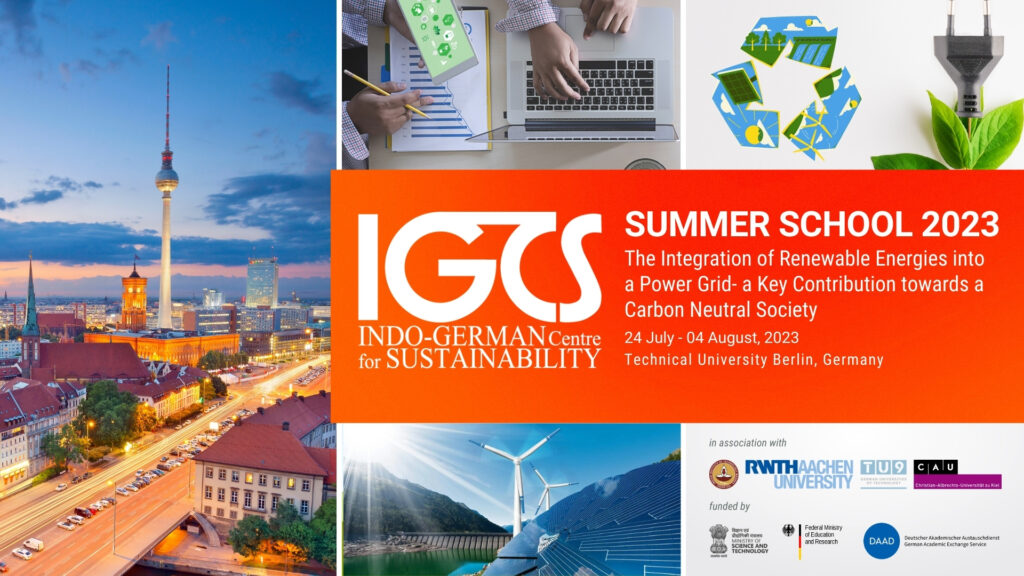
Achieving net-zero emissions, mitigating climate change, preventing the excessive depletion of natural resources, and reducing waste are major challenges the world is facing today. The energy sector is of particular importance in meeting these challenges.
Nowadays, the primary targets and concerns worldwide are energy transition, clean energy, sustainable energy, and energy security. Based on the three main trends shaping the current and future global energy landscape – decarbonization, decentralization, and digitalization – the integration of renewable energy systems into the existing power grid represents a key challenge for an innovative and viable solution towards a carbon-neutral future.
The energy system of the future must be achieved through sustainable management of natural resources, ensuring sustainable consumption and production patterns, developing energy infrastructure and technologies, and raising political and social awareness to contribute to this overall system development.
This year IGCS Summer School focuses mainly on the technical aspects of integrating different renewable energy sources into the existing power grid as an innovative and potential solution towards a sustainable and clean energy future. The economic, environmental, and social aspects of this system will also be discussed during the school. It brings together students from Indian and German institutions, who will jointly and interactively develop their skills with the following learning outcomes:
- developing a fundamental and holistic understanding of the technical aspects of integrating different renewable energy sources into the existing power grid
- identifying the technical challenges that must be overcome to integrate a high proportion of renewable energy into the existing grid, such as developing infrastructure and technology, coordinating power generation from multiple sources, balancing power supply and demand, advancing grid storage options, and increasing energy flexibility.
- identifying the main challenges and outstanding issues related to the implementation of renewable energy resources from economic, environmental, and social perspectives.
- proposing innovative solutions and strategies to implement renewable resources on a large scale.
IGCS Winter School 2023
February 20 – March 03. 2023
IIT Madras, Chennai, India
Microgrid — A Key Contribution Towards Carbon Neutral Society
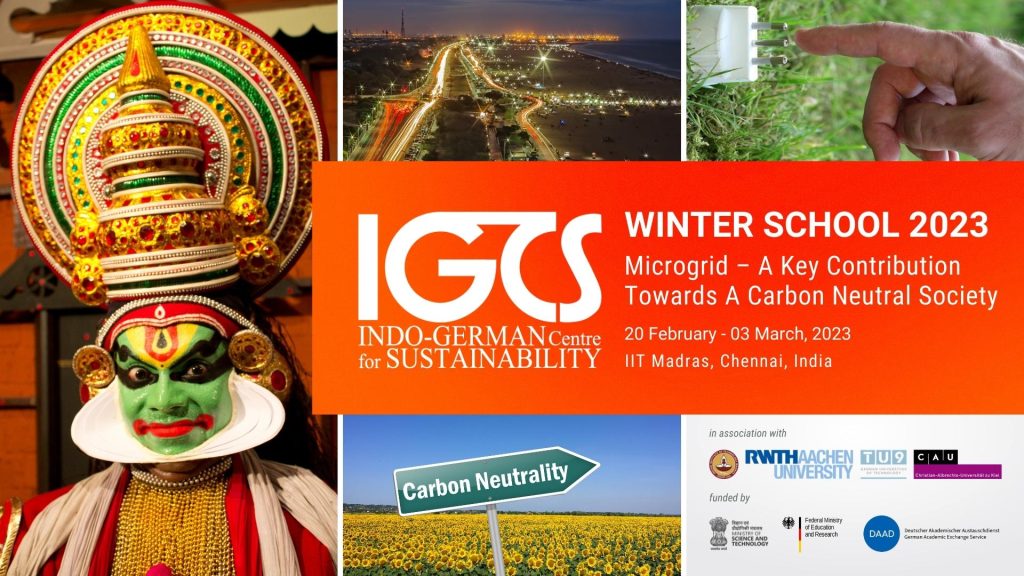
Energy transition, clean energy, sustainability, carbon neutrality, defossilization as well as energy security have become primary targets and concerns worldwide.
Access to affordable, reliable, and sustainable energy is not only the key to the attainment of these targets but also the main promoter in achieving other sustainable development goals SDGs such as quality education, health, clean water, and sanitation in addition to different social services.
Based on the three main trends shaping the current and future global energy landscape – defossilization, decentralization, and digitalization – the promotion of renewable energy systems, mainly through microgrids is becoming one of the potential approaches and an innovative and viable solution toward a clean energy future, especially in areas not served by centralized electrical infrastructure.
Arising from the idea that energy security, economic benefits, and clean energy integration are the main drivers of microgrid development and deployment worldwide, this winter school aims at demonstrating microgrids as reliable and resilient power systems from different perspectives.
It brings together Indian and German students who will jointly and interactively develop their skills with the following learning outcomes:
- Recognizing the concept of microgrid, its components, operation, modeling, and optimization.
- Identifying the main challenges and outstanding issues in the ubiquitous/ widespread application of microgrids from economic, environmental, and social perspectives.
- Proposing innovative solutions and strategies to implement microgrids as a sustainable energy system.
IGCS Summer School 2022
July 18 – July 29. 2022
RWTH Aachen University, Aachen, Germany
Sustainable Waste Management in The Nexus of Climate Change and Low Carbon Economy
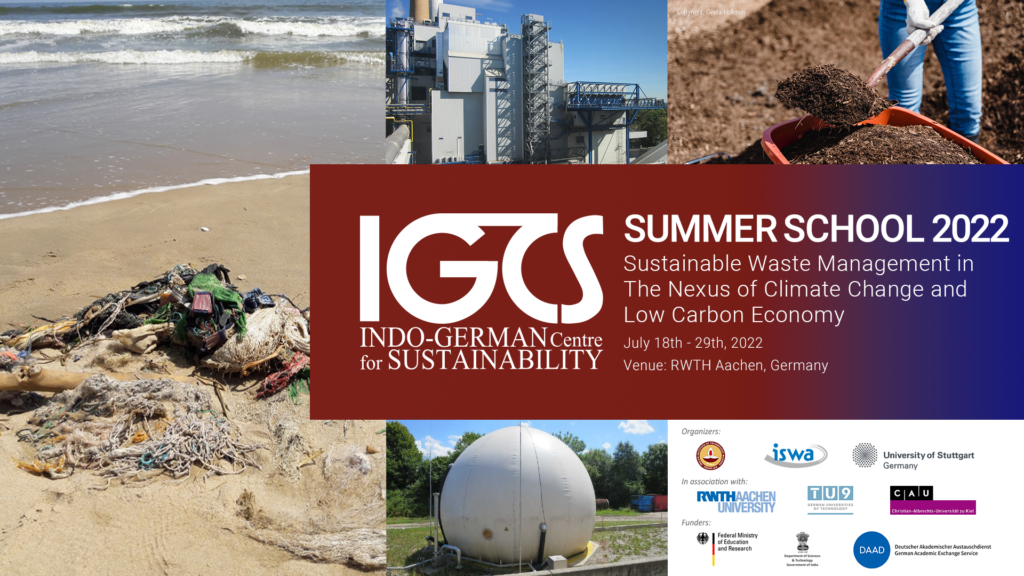
Achieving net-zero emissions and zero carbon footprint by the year 2050 are the major targets set by every nation to preclude the worst effects of climate change. Defossilization, switching to circular economy models to increase circularity per capita, adopting nature-based regenerative and resilient climate solutions, reducing our dependency on fossils, augmenting energy efficiency in production processes and waste prevention are the key interventions required to meet the net-zero goals. Sustainable waste management is central to the development and deployment of strategies to transition to a „low carbon circular economy“ in order to build a sustainable economic, natural and social capital.
Addressing sustainable waste and resource management requires an interdisciplinary and integrated approach that considers advances in research, technological implementations, Waste Prevention, reuse and recycling approaches, management and regulatory aspects, as well as the socio-economic and environmental considerations.
This edition of the IGCS Summer School aims to bring out the connections of sustainable waste management with clean energy, energy efficiency, reducing CO2 emissions, bio-based economy, and restoration of the ecosystem and its services. Topics that will be deliberated include best practices and emerging strategies in Germany and India, such as composting of biodegradable wastes, handling of construction debris, incineration of residual waste, plastics upcycling methods, liquefaction of unsegregated municipal solid wastes, and recycling of industrial wastes.
It brings together Indian and German students who will jointly and interactively develop their skills with the following learning outcomes:
- Identifying measures and opportunities in the circular economy to contribute to climate protection
- Developing a fundamental and holistic understanding of different waste management systems and technologies
- Proposing innovative solutions to strengthen the circular economy
IGCS Winter School 2022
February 21 – March 04. 2022
IIT Madras, Chennai
Sustainable Waste Management for a Circular Economy
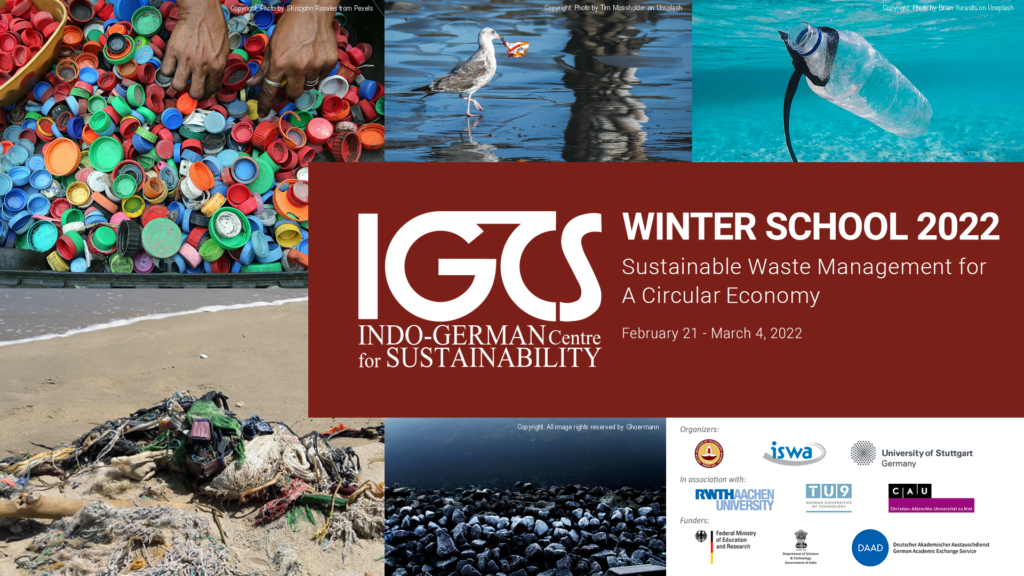
Growing economies with the current linear production and consumption systems are creating an imbalance in the environment and in the flow of materials and resources. Huge amounts of waste are generated as a result of anthropogenic activities, and the management capacities of these waste streams are already over the limit. With the climate challenges and the current increase in demand and shortage of resources, the handling of wastes requires circular approaches that permit the recovery of resources for a more sustainable economy. The conventional thinking about wastes “out of sight – out of mind” should be replaced by “waste-to-wealth” for a sustainable society. Efficient waste management systems are necessary to reduce pollution of water, air and soil, and for the protection of the natural resources and our ecosystems. Sustainable waste management is an important element towards a circular economy and the reduction of emissions. Moreover, it can enable a more just and healthy society.
Addressing sustainable waste and resource management requires an interdisciplinary and integrated approach that considers advances in research, technological implementations, reuse and recycling approaches, management and regulatory aspects, as well as the socio-economic and environmental considerations.
This edition of the IGCS winter school is focused on municipal solid waste management, plastic waste management, industrial waste management and responsible reuse of wastewater, wherein experts from India and Germany would share their experiences and best practices for a sustainable society.
It brings together Indian and German students who will jointly and interactively develop their skills with the following learning outcomes:
- Develop a fundamental and holistic understanding of the different waste-to-value processes.
- Evaluate different technologies for resource, materials and energy recovery from wastes from a sustainability and environment viewpoint.
- Propose innovative and circular solutions to practical waste management problems.
IGCS Summer School 2021
July 12 – 23. 2021
Christian-Albrechts-Universität zu Kiel
Sustainable Water Management at the Saltwater-Freshwater Interface
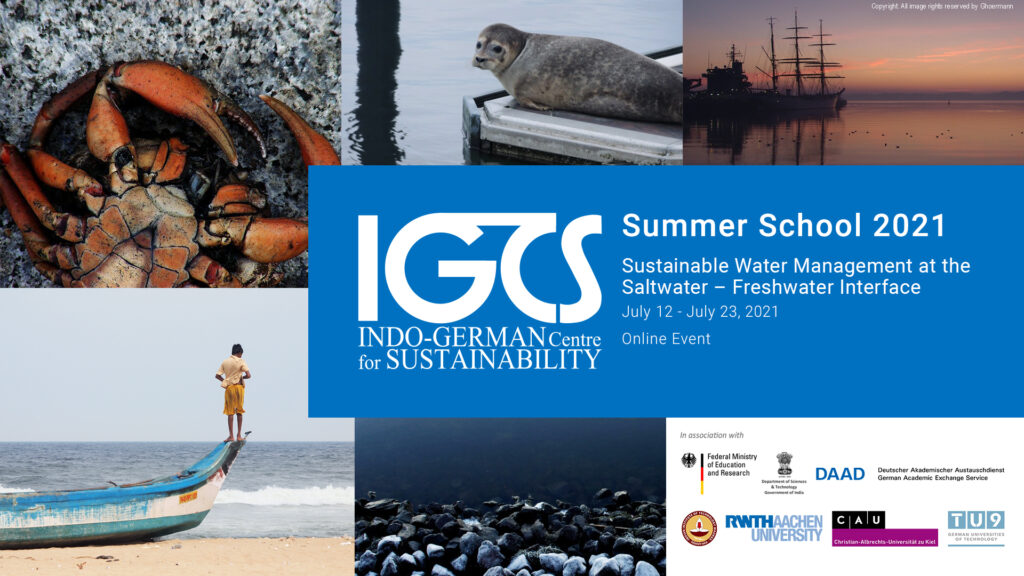
Water is vital for the development of human beings and any form of life. However, water is under severe pressure due to population growth, rapid urbanization, consumption, pollution, and climate change, among others. This is a major concern in highly developed countries, like Germany, but even more for highly populated developing countries like India. In this context, the United Nations World Water Development Report 2020 considers that water security will be one of the most critical crises of the world during the next several decades.
To raise awareness and tackle this issue, the United Nations also included ensuring availability and sustainable management of water and sanitation as one of the 17 Sustainable Development Goals that are intended to be achieved by the year 2030. Worldwide at the national, regional, and local levels, a remarkable number of stakeholders make an effort to find solutions for the sustainable management of water. Addressing sustainable management of water requires the application of an interdisciplinary and integrative approach that includes all kinds of stakeholders.
Coastal zones, the narrow transition areas that connect terrestrial and marine environments, are home to 60% of the major cities of the world and 40% of the world’s population live within 100 km of a coastal zone. Coastal zones are also the most productive and valued ecosystems of our planet, having the saltwater-freshwater interface area a special interest because of their singularity. They represent a unique example of the relationships between humans and ecosystems and a priority area for the sustainability concept’s implementation.
This Summer School attempts at elucidating the challenges and potential solutions for sustainable management of saltwater-freshwater interfaces as well as spreading successful current examples of management in India and Germany. It brings together Indian and German students who will jointly and interactively develop their skills to the following themes:
- Identifying challenges for sustainable management of saltwater-freshwater interfaces.
- Understanding the disruptive role of climate change.
- The future of saltwater-freshwater interfaces today: new ideas on sustainable management.
IGCS Winter School 2021
February 22 – March 07. 2021
RWTH-Aachen University
Sustainable Inland Water Transportation for Blue Economy
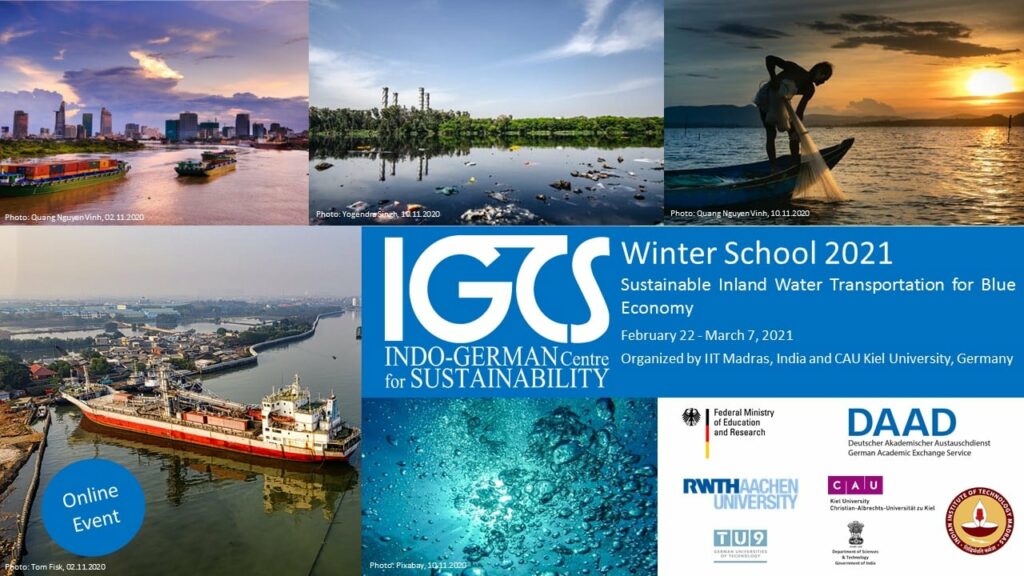
Inland waterways play a vital role in the Blue economy globally. Blue economy describes all economic activities related to oceans, seas and coasts. Blue economy covers a wide range of interlinked established and emerging sectors. Historically, inland waterways have been used for transportation purposes. In many countries, it is one of the major components of the transportation system. Many major cities in the world are inseparably linked to the rivers, on the banks of which they were founded. Inland Waterway Transport (IWT) and the exchange of goods associated with it have been continuing which play an extremely important role for the economic development of many communities and regions. Many goods and raw materials make their way along inland waterways, which have not yet reached their full capacity by any stretch of the imagination. The excellent environmental credentials, the high safety standards for shipments and the large carrying capacity of the vessels are just some of the outstanding features of this long-standing mode of transport. At present, several development projects and initiatives aimed at improving IWT infrastructure and operations are under way throughout the world. These projects offer both economic and environmental advantages. IWT is arguably the most energy-efficient of the transport modes, play significant role in logistics supply chain and increase in job opportunities both directly and indirectly.
This Winter School attempts to look into the developmental initiatives, issues and challenges, improving IWT infrastructure and operations that can strengthen further the IWT sector. It brings together Indian and German students who will jointly and interactively develop their skills with respect, for instance, to the following themes:
- Understanding the systemic nature of IWT activities
- Identify the challenges and issues in IWT – special reference to channel maintenance and navigation
- Recognizing sustainability issues associated with IWT transport – Strengthening public-private partnership
- Understanding the systemic nature of urban transport activities
- Developing ideas on ‘smart technology’ solutions
IGCS Summer School 2020
October 5 – 16. 2020
RWTH Aachen University
Smart Sustainable Cities: Focus on Urban Mobility

Urban areas stand out as places where high population densities and agglomerating economic activities cause various environmental problems. This holds for larger cities in highly developed countries, such as Germany, but even more for megacities in less developed countries like India. Especially the transport and mobility sector counts for large shares of urban air pollution and particulate matter (PM) emissions, due to job commuting from suburban areas, the inflow of goods for urban consumers, and the material logistics associated with manufacturing.
To tackle the environmental issues triggered by these activities, actors of urban development and planning eagerly search for ways to systematically use novel information technologies (IT) and digital innovations for urban sustainability transition. Visions of the smart, intelligent, IT controlled, and knowledge-driven city have recently started guiding various public initiatives towards achieving more sustainability, flanked also by private agency and social innovations. Against this backdrop, a growing range of ‘smart mobility’ options come up that use novel IT solutions for reducing the CO2 footprint of urban traffic.
This Summer School attempts at elucidating crucial urban sustainability problems and solutions relating to mobility and transport. It brings together Indian and German students who will jointly and interactively develop their skills with respect, for instance, to the following themes:
- Recognizing sustainability issues associated with urban transport
- Understanding the systemic nature of urban transport activities
- Developing ideas on ‘smart mobility’ solutions
IGCS Winter School 2020
February 15 – 29, 2020
IIT Madras, Chennai
Sustainability in the Peri-cene: Human settlements, food, ecology and governance

It is nearly 33 years since the UN World Commission on Environment and Development (known in short as the Brundtland Commission) famously defined sustainable development as a process of change in which the “exploitation of resources, the direction of investments, the orientation of technological development; and institutional change are all in harmony and enhance both current and future potential to meet human needs and aspirations.” During the past 3 decades, global land use changes seem to discredit that expectation by moving in the reverse direction.
Seen from space, the Earth’s land surface is increasingly a mottled landscape made up largely of the built environment, comprising roads, buildings and industrial farming systems, with only a few islands of non-engineered natural systems. Cities, which used to be self-contained units surrounded by the vast countryside, now appear to be simply more dense settlements than those that can be seen elsewhere. It therefore seems imperative to blur the distinctions across cities, small towns and rural areas and to examine the new forms of ‘periurbanisation’ of the so-called hinterland, whose sustainability challenges are vast and growing.
This Winter School is an attempt to pick up the pieces around sustainability and land to try to formulate a more integrated view. It will cover the following themes:
- Sustainable development and land
- Urbanisation and the land-water-food-ecosystems nexus
- Sustainable governance beyond cities
IGCS Summer School 2019
June 15 – 26, 2019
Technical University Dresden, Germany
Smart Grids – Electricity Networks as the Backbone of a Carbon Neutral Society

Converting our actual energy systems into carbon neutral structures imply the replacement of fossil fuel powered generation to renewable generation. This revolution can be seen by Germany exiting nuclear power generation until 2022 and exiting coal based power generation until 2038. In India the share of renewable energy resources in the energy mix has reached 33% in 2018 and will develop further. To anticipate the social development, India will install additional 100 GW of solar power generation, whereas 40 GW is dedicated to rooftop solar in rural areas and city districts where social development is needed. In terms of the power grids it can be stated, that these developments forcing the grids towards a major transition. The need of integrating renewables, spread of power electronics in all types of applications, climate change, communication technologies, use of electric vehicles requires new concepts and technologies to enable a reliable and resilient power grid. Power grids are poised to become smarter in order to be able handle all these new requirements. The 2019 IGCS Summer School will look at various aspects of smart grids:
- Concepts of Electrical Energy Networks
- Stakeholder Interaction: Transmission Systems, Distribution Systems, Rural Electrification
- Sector Coupling: Energy Conversion, Storage, Utilization
- Grid Components
- Power Grids under the Aspects of Economy, Ecology and Regulation
IGCS Winter School 2019
February 23 – March 9, 2019
IIT Madras, Chennai
Sustainable Waste Management – Municipal Solid Waste and e-Waste: How can waste be reduced and recycled in rapidly growing cities?

With rapid urbanization and increasing population around the world, solid waste generation is bound to increase multiple times in near future. It is essential to reduce and to manage this huge generation of waste effectively in future, sustainable, and SMART cities, whatever the case may be. Electronic waste, commonly known as e-waste is another upcoming challenge which has to be dealt as TECHNOLOGY and DIGITISATION (SMART Technologies and Internet of Things) will be an integral part of cities at a much larger scale in future. Though most of the e-waste is recyclable, very little is actually and scientifically recycled at present. In this winter school, we focus on how to deal with these challenges sustainably. Knowledge transfer from experts in the field to the participants of the school will be through a combination of lectures, focused team project works and field visits. This knowledge can be further used and developed by the participants in their respective areas.
IGCS Summer School 2018
July 14 – 25, 2018
RWTH Aachen University
Coastal and River Hazards & Management Strategies
In times of a globally changing climate, significant variabilities are especially felt at coasts and in fluvial environments. The 2018 IGCS summer school offers the opportunity to learn about both the scientific background of these coastal and fluvial hazards, as well as the evaluation and (sustainable) management strategies which might be applied to deal with them. In collaboration with the Indian Institute of Technology Madras (IITM) in India, as well as the Research Institutes for Water and Waste Management (FiW) and Neotectonics and Natural Hazards (NUG) at RWTH Aachen University (Germany), we offer a programme of lectures and workshops by representative scientists and experts from India and Germany complemented with topic-related field trips in the region of Aachen. To create a challenging atmosphere in which we can initiate an interdisciplinary Indo-German dialogue, we welcome interested students of different backgrounds to apply.
IGCS Winter School 2018
February 24 – March 7, 2018
IIT Madras, Chennai
Smart Grids – Sustainable Integration of Renewables for Tomorrow’s Power Grids

Power grids across the world are in a transition phase. The need to integrate renewables, spread of power electronics in all types of applications, climate change, communication technologies, use of electric vehicles, and drive to make the system robust with power available to all are major drivers. Power grids therefore are poised to become smarter in order to be able handle all these. This winter school will look at these various aspects of smart grids. With the range of topics that will be discussed including social impact, the Winter School is aimed to provide a truly holistic view about the future growth of power grids.
IGCS Summer School 2017
July 15th – 28th 2017
RWTH Aachen University
Sustainable Urban Water and Wastewater Management: India – Germany
The IGCS Summer School 2017 offers an interesting opportunity for students from India and Germany in the field of water management and engineering. With a focus on sustainable urban water and wastewater management, the Summer School intents to initiate an Indo-German dialogue on sustainable challenges and future solutions. In collaboration with the Research Institute for Water and Waste Management at RWTH Aachen University (FiW) and other partners, we offer a program of lectures and case studies by representative scientists and experts from India and Germany complemented with topic-related field trips to water authorities, water boards and drinking water utilities in the region of Aachen. Participating students are given an insight into technological concepts and management approaches during own project group work. In order to create an interdisciplinary atmosphere, we welcome interested students with different backgrounds to apply.
IGCS Winter School 2017
February 20 – March 4, 2017
IIT Madras, Chennai
Sanitation-Water-Health Nexus for Sustainable Development
Rapid growth in urbanization in India and elsewhere in the world has been leading to over exploitation of water sources. At the same time, ever increasing population is leading to significant generation of solid and liquid waste. Unfortunately, development of waste management infrastructure is lagging behind the increasing demand, especially in developing countries, leading to fast deterioration of water quality. Also, there appears to be a lack of coordination among the different agencies involved in providing drinking water and primary health facilities, and managing sanitation and municipal solid waste. The aim of this winter school is to learn about the nexus between sanitation – water quality – hygiene, and how this affects the sustainable development. The winter school will comprise of lectures, excursions and student projects. The lectures will cover topics related to appropriate on site and decentralized waste management facilities, practices to protect water sources, the social and behavioral changes needed, and other challenges and the way forward.
IGCS Summer School 2016
July 9 -18, 2016
Technical University Berlin
Biomass and Coal – Two Carbon Fuels of Different Ages: German and Indian Perspectives
The nine-day program addresses a variety of aspects related to the sustainable and clean use of biomass and coal. Lectures by German and Indian representatives from academia, industry, and politics will introduce into technical, environmental, economic, and political aspects of the supply and use of these two solid fuels. These lectures will be designed to foster a lively discussion between the participants. Furthermore, the participants will carry out projects related to the topics of the lectures. Here, the participants are expected to team up with their fellow students with different academic backgrounds to achieve fruitful results based on interdisciplinary teamwork. The program is complemented by topic-related excursions.
IGCS Winter School 2016
February 22 – March 5, 2016
IIT Madras in collaboration with OWI Oel-Waerme-Institut GmbH
Sustainable Application of Liquid Biofuels
Sustainability is fast becoming the keyword in all development domains, especially in the area of energy. The public awareness of global energy issues and the growing concerns on depletion of fossil fuels and their adverse environmental implications has generally prompted search of alternative renewable sources of energy. Biofuels are emerging as alternatives fossil fuels used in combustion systems such as burners, engines etc.
The Winter School will focus on technologies in the energy domain with emphasis on liquid biofuels as sustainable fuel for future use. The coverage will be introductory but comprehensive. This IGCS Winter School will focus on production, characterization and the utilization of liquid biofuels covering related fundamentals, technological implications and policy issues. Along with class room lectures, the schedule of this Winter School will include laboratory activities, short focused team projects, brainstorming sessions and visits to biofuel facilities around Chennai.
IGCS Summer School 2015
May 27 – June 10, 2015
Kiel University (CAU Kiel)
Sustainable Water Management in Rural Landscapes
Rural regions are essential for hydrology. The inhabitants act both as consumers and as stakeholders for a sustainable management of catchments. The aim of this summer school is to learn how to manage these regions with an interdisciplinary and holistic approach. After basic lectures and introductions we will use hydrological models to calculate management scenarios for water resources. In addition we will estimate the economic and ecological consequences and integrate them in the final decisions. We will also work out and use environmental indicators as a valuable tool for an integrated and sustainable management of the water resources in rural regions. The theoretical exercises will be supplemented by excursions and discussions with local stakeholders in Schleswig-Holstein.
IGCS Winter School 2015
March 2 – 15, 2015
Indian Institute of Technology Madras
Sustainable Water Management in Urban Areas
There has been a significant growth in urbanization all over the world in recent years. For instance, number of cities and towns in India has increased from 5161 in the year 2001 to 7935 in the year 2011. This is putting a lot of stress on the sources of water for the urban areas, both from the point of view of quality and quantity. The aim of this winter school is to learn how to sustainably develop and manage the water resources infrastructure in the urban areas. The winter school comprising of lectures, excursions and student projects, will cover all the aspects of urban water management including water treatment, water distribution, wastewater management, source protection, adaptation to climate change, the role of public private partnership and equitability in water supply. The effect of expanding urban areas on water resources will also be dwelt upon.
IGCS Summer School 2014
June 16 – 28, 2014
University of Stuttgart
Sustainable Management of Resources – Closing the Loop: Solid Waste and Waste Water Management
The shortage of resources and global warming are big challenges on global and local level. Sustainable solid waste and water management play an important role in resource efficiency and to substitute fossile fuels by closing the loop of materials and water systems and by energy recovery of organic residues. Sustainability also means to reduce pollutants in waste and waste water (e.g. anthropogenic trace compounds). How will we meet the challenge? Technical, social and also economical aspects have to be addressed. We want to develop sustainable systems in solid waste and water management in lectures, workshops with projects and excursions, working together in interdisciplinary groups.
IGCS Winter School 2014
March 3 – 16, 2014
Indian Institute of Technology Madras
Sustainability in Theory and Practice – Exploring sustainable development
IGCS Summer School 2013
July 2 – 15, 2013
RWTH Aachen University
Sustainable Development of Future Urban Environments – Integrated Approaches for Sustainable Waste and Water Management

